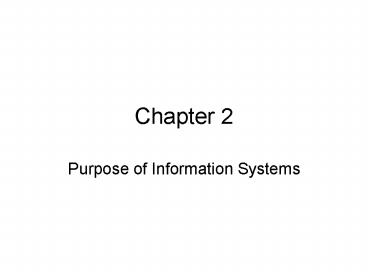Purpose of Information Systems - PowerPoint PPT Presentation
Title:
Purpose of Information Systems
Description:
Lock in customers or buyers. Lock in suppliers. Raises barriers to ... Lock's customers into the ABC system (switching cost) Raises the barrier to market entry ... – PowerPoint PPT presentation
Number of Views:25
Avg rating:3.0/5.0
Title: Purpose of Information Systems
1
Chapter 2
- Purpose of Information Systems
2
Agenda
- Information Systems Purposes
- Information Systems and Competitive Advantage
- Information Systems and Problem Solving
- Information Systems and Decision Making
- Discussion and Case Study
3
Information Systems Purposes
- Gain competitive advantage
- Solve problems
- Assist in decision making
4
Competitive Advantage - I
- Products
- Create a new product or service
- Enhance new products or services
- Differentiate products or services
- creation of barriers
- Lock in customers or buyers
- Lock in suppliers
- Raises barriers to market entry
5
Competitive Advantage - II
- Establishing alliances
- Establish standards
- Promote product awareness and needs
- Develop market size
- Reduce purchasing costs
- Reducing costs
- Reduce prices
- Increase profitability
6
Information System and Competitive Advantage
- ABC information system features
- Store customer data, shipping identity, and
location - Print shipping label and bar code (package
delivery system) - Reduce paper work and error
- Provide email to sender, receiver, and other
(information delivery system) - Competitive Advantages
- Enhances an existing product
- Differentiates the ABC package delivery product
from competitors - Locks customers into the ABC system (switching
cost) - Raises the barrier to market entry
- Reduces costs
7
Problem Definition
- A perceived difference between what is and what
is not - The differences between what is and what ought to
be by describing both the current and desired
situations - Different information systems for different
problem definitions - A complete, accurate, and agreed-upon problem
definition by every user for the development of a
good and useful information system
8
Information Systems and Problem Solving
- Three different information systems for solving
computer lap top problem - Customer relationship management (CRM) system
- Knowledge management system (KMS)
- Manufacturing Quality-Control Information System
9
Customer Relationship Management System
- Maintain data about customers and all of their
interactions with the system - Sales activity
- Purchase
- Return
- Training
- Support call
- Service
- Repair
- Vary in the size and complexity
10
Knowledge Management System
- Store and retrieve organizational knowledge in
the form of data, documents, or employee know-how - Make the organization knowledge available to
- Employees
- Vendors
- Customers
- Investors
- Press
- Other individual needs the knowledge
11
Manufacturing Quality-Control System
- The optimal way to provide customer service is to
eliminate the need for it - Improve customer service is to improve
manufacturing quality, planning, and scheduling
12
Decision Making Dimension - Level
- Operational decisions concern day-to-day
activities - Transaction processing systems (TPS)
- Managerial decisions concern the allocation and
utilization of resources - Management information systems (MIS)
- Strategic decision making concern broader-scope
organizational issues - Executive information systems (EIS)
13
Decision Making Dimension - Process
- Structured decision process an understood and
accepted method for making the decision - Unstructured process no agreed on decision
making process - Structured and unstructured refers to the
decision process-not the underlying subject.
14
Decision-Making Dimension
15
Information Systems Type
- Automated information systems the computer
hardware and program components do most of the
work - Humans start the programs and use the results
- Augmentation information systems humans do the
bulk of the work - To aid the management decision process (email,
instant messaging, video-conferencing, etc.)
16
Automated vs. Augmentation IS
17
Information Systems and Decision Making
- Intelligence gathering
- Alternative formulation
- Choice
- Implementation
- Review
18
Discussion
- Security (27a-b)
- Name the competitive advantages for a financial
institution by implementing a security system - The cost of no security for a financial institute
- Ethics (29a-b)
- Social impact of the digital divide
- Social responsibility of the business and
government to improve the situation - Opposing forces (31a-b)
- Can a business survive without any IS today?
- Egocentric vs. empathetic thinking (33a-b)
- How to apply this concept in developing and using
IS?
19
Case Study
- Case study 2-1(41-42)
- Questions 1, 2, 7, 8, 10, and 11
20
Points to Remember
- Information Systems Purposes
- Information Systems and Competitive Advantage
- Information Systems and Problem Solving
- Information Systems and Decision Making
- Discussion and Case Study































